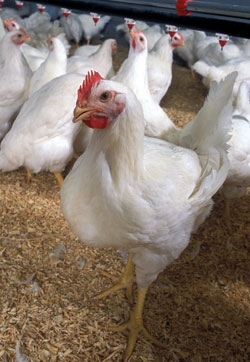Posts Tagged: Sean Kriletich
The price of chicken feed is rising
Soaring feed costs are forcing San Joaquin Valley poultry producers to cut costs, raise prices - and, in some cases, close their doors, reported Robert Rodriguez in the Fresno Bee this weekend. Feed prices have climbed as much as 50 percent since last year, fueled by the increasing demand for corn.
Director of the UC Agricultural Issues Center Daniel Sumner told the reporter that rising costs for poultry producers will boost the retail price, unless something else acts to keep prices down.
"So, bottom line," Sumner said, "we should see higher retail prices with these high grain and oilseed prices."
Ranchers beef over obstacles to local meat
Carlos Alcalá, Sacramento Bee
Small ranchers in El Dorado County gathered at a Local Meat Summit in Placerville last week to discuss obstacles to selling their products locally. Meat must be harvested at a USDA-approved facility, and there aren't many of those.
Program representative Sean Kriletich of UC Cooperative Extension in Amador and Calaveras counties is working with ranchers to solve the problem.
"We're trying to work toward getting a USDA-inspected facility for our region," Kriletich said.
If more small ranchers can find a way to sell grass-fed beef locally, it will do more than benefit the farmers, Kriletich said. It will preserve open space for the entire community.
"If people want to keep more land in agriculture, we have to get more money to the producers," said Kriletich, who said he used to run cattle himself, where El Dorado Hills subdivisions now sit.
Beekeepers asking Humboldt cities to loosen regulations on residential hives
Grant Scott-Goforth, The Willits News
A recent change in attitudes toward urban sustainability and education about bee culture spurred the Humboldt County Beekeepers Association to ask the cities of Arcata and Eureka to loosen restrictions on residential beekeeping.
UC Cooperative Extension farm advisor Deborah Giraud said the risks of keeping bees in residential areas are minimal. ”In general, it's really important to have more honeybees,” Giraud said. “We have a lot of problems with pollination here because of weather. Most calls in here are about fruit trees. And it's a pollination problem.”


